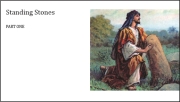 Begin this week’s study by reading Genesis 28.10-.19 then come back here and keep reading. You’ll be glad you did. Clearly when Jacob stopped to rest the place he chose to camp was unremarkable. It was an ordinary place, and he chose an ordinary stone for a pillow. This sounds uncomfortable but it doesn’t have to be. A properly shaped stone behind your neck can be wonderfully relaxing, especially at the end of a long journey. But I want to be sure we understand that there were no signs posted: “No Trespassing – Holy Ground!” There was nothing mystical about the stone he slept on; it held no magical powers. Yet in the light of the new day both the ground and the stone would be honored in a special way.
Begin this week’s study by reading Genesis 28.10-.19 then come back here and keep reading. You’ll be glad you did. Clearly when Jacob stopped to rest the place he chose to camp was unremarkable. It was an ordinary place, and he chose an ordinary stone for a pillow. This sounds uncomfortable but it doesn’t have to be. A properly shaped stone behind your neck can be wonderfully relaxing, especially at the end of a long journey. But I want to be sure we understand that there were no signs posted: “No Trespassing – Holy Ground!” There was nothing mystical about the stone he slept on; it held no magical powers. Yet in the light of the new day both the ground and the stone would be honored in a special way.
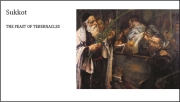 Sukkot, or the Feast of Tabernacles, begins today at sunset. This Jewish holiday, one of seven feasts instituted by God himself, is a seven or eight day celebration depending on if you are celebrating in Jerusalem or outside Israel. In the distant past it could be difficult to know what day exactly the celebration was held on as, like most of the feasts, it starting day was determined by the phase of the moon. If it were a cloudy night, for example, the moon could not be observed, leading to some allowances for those who could not make the journey to Jerusalem. This year it is celebrated during a blood moon.
Sukkot, or the Feast of Tabernacles, begins today at sunset. This Jewish holiday, one of seven feasts instituted by God himself, is a seven or eight day celebration depending on if you are celebrating in Jerusalem or outside Israel. In the distant past it could be difficult to know what day exactly the celebration was held on as, like most of the feasts, it starting day was determined by the phase of the moon. If it were a cloudy night, for example, the moon could not be observed, leading to some allowances for those who could not make the journey to Jerusalem. This year it is celebrated during a blood moon.
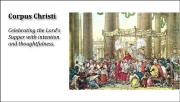 Tomorrow the liturgical church celebrates Corpus Christi, a Christian feast celebrating Communion. Most protestant churches do not celebrate the event as it is a decidedly Catholic invention, and one that espouses a very different theology surrounding the Communion elements (bread and wine) than does the non-liturgical churches. Because of the theological element its worth understanding the holiday.
Tomorrow the liturgical church celebrates Corpus Christi, a Christian feast celebrating Communion. Most protestant churches do not celebrate the event as it is a decidedly Catholic invention, and one that espouses a very different theology surrounding the Communion elements (bread and wine) than does the non-liturgical churches. Because of the theological element its worth understanding the holiday.
 At the start of my first semester at Moody Bible Institute I sifted through the syllabus for every class and jotter on a calendar the day each assignment was due. I then created a list in chronological order of the assignments so that in every spare moment of time I could glance at the list and write the next paper or read the next book.
At the start of my first semester at Moody Bible Institute I sifted through the syllabus for every class and jotter on a calendar the day each assignment was due. I then created a list in chronological order of the assignments so that in every spare moment of time I could glance at the list and write the next paper or read the next book.
 In the West, the God of Christianity has been superseded by the gods of modernity: money, sex, fame, power. These gods give a good life, but they cannot sustain life. As Christianity is a dying faith in every Western nation, every Western nation is dying.
In the West, the God of Christianity has been superseded by the gods of modernity: money, sex, fame, power. These gods give a good life, but they cannot sustain life. As Christianity is a dying faith in every Western nation, every Western nation is dying.
 Yesterday we read that just before departing Corinth for home Paul shaved his head. Luke cryptically tells us that this was due to a vow. Just what vow was taken, and why would it involve shaving one’s head? It is best to allow Scripture to interpret Scripture whenever possible, and this is a case where it may be possible.
Yesterday we read that just before departing Corinth for home Paul shaved his head. Luke cryptically tells us that this was due to a vow. Just what vow was taken, and why would it involve shaving one’s head? It is best to allow Scripture to interpret Scripture whenever possible, and this is a case where it may be possible.
 What could be so important as to interrupt our series on the Acts of the Apostles? Father’s Day which falls on this coming Sunday. Why is it so important? Because Dad’s need to be encouraged.
What could be so important as to interrupt our series on the Acts of the Apostles? Father’s Day which falls on this coming Sunday. Why is it so important? Because Dad’s need to be encouraged.
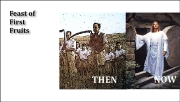 Today starts the Feast of First Fruits. Leave it to God to not have one feast, but to keep piling them up, one on top of another, in abundance. On the Jewish calendar we see that Passover is celebrated on the 14th of Nissan, the Feast of Unleavened Bread starts on the 15th (and continues through to the 21st), and the Feast of First Fruits on the 16th.
Today starts the Feast of First Fruits. Leave it to God to not have one feast, but to keep piling them up, one on top of another, in abundance. On the Jewish calendar we see that Passover is celebrated on the 14th of Nissan, the Feast of Unleavened Bread starts on the 15th (and continues through to the 21st), and the Feast of First Fruits on the 16th.
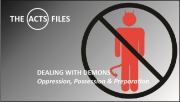 Acts 19 tells the only story of an unsuccessful exorcism in all of Scripture. The seven sons of Sceva tried to invoke the power of the name of Jesus without first preparing properly for the battle. As a result, they were defeated, embarrassed, and luck to escape with their lives. If these Jewish exorcists were so abused, what hope does any Christian have when in the presence of such evil forces?
Acts 19 tells the only story of an unsuccessful exorcism in all of Scripture. The seven sons of Sceva tried to invoke the power of the name of Jesus without first preparing properly for the battle. As a result, they were defeated, embarrassed, and luck to escape with their lives. If these Jewish exorcists were so abused, what hope does any Christian have when in the presence of such evil forces?
 Yesterday we read about Paul’s proclamation of impeding judgment. His message, while reasoned very differently, didn’t differ from Jonah’s message to Nineveh centuries earlier. Both men called a people to repentance in order to avoid God’s judgment. The only significant difference between the two messages is that Jonah had set the judgment day as 40 days hence, while Paul’s message leaves the day open ended. When considering the creations complete history, Judgment day was near during Paul’s time. How much nearer is it for us?
Yesterday we read about Paul’s proclamation of impeding judgment. His message, while reasoned very differently, didn’t differ from Jonah’s message to Nineveh centuries earlier. Both men called a people to repentance in order to avoid God’s judgment. The only significant difference between the two messages is that Jonah had set the judgment day as 40 days hence, while Paul’s message leaves the day open ended. When considering the creations complete history, Judgment day was near during Paul’s time. How much nearer is it for us?
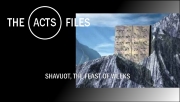 Today is the Jewish holiday Shavuot, the Feast of Weeks, also known as Pentecost.
Today is the Jewish holiday Shavuot, the Feast of Weeks, also known as Pentecost.
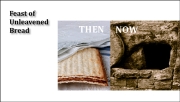 Today starts the second feast of the Lord, the Feast of Unleavened Bread. A week-long celebration, it begins the day after Passover and is often lumped in with that feast and called the 8 days of Passover.
Today starts the second feast of the Lord, the Feast of Unleavened Bread. A week-long celebration, it begins the day after Passover and is often lumped in with that feast and called the 8 days of Passover.
